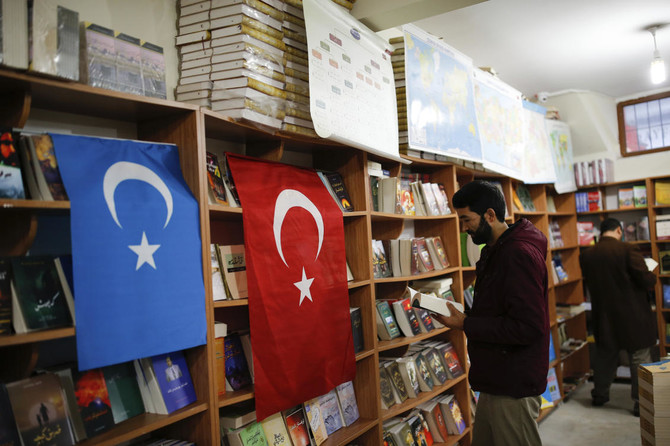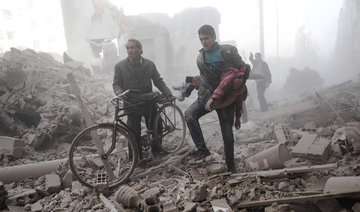ISTANBUL: It was mid-afternoon when the Chinese police officers barged into Ali’s house set against cotton fields outside the ancient Silk Road trading post of Kashgar. The Uighur farmer and his cowering parents watched them rummage through the house until they found two books in his bedroom — a Qur’an and a handbook on dealing with interrogations.
Ali knew he was in trouble.
By nightfall the next day, Ali had been tied against a tree and beaten by interrogators trying to force him to say he took part in an ethnic riot that killed dozens in western China. They held burning cigarette tips to Ali’s face, deprived him of sleep and offered him only salt water. When he asked for fresh water, they gave it to him — in buckets poured over his head.
That winter night in 2009, Ali recalled years later, would set him on a path that ended on northern Syria’s smoldering plains, where he picked up a Kalashnikov rifle under the black flag of jihad and dreamed of launching attacks against the Chinese rulers of his homeland.
Since 2013, thousands of Uighurs, a Turkic-speaking Muslim minority from western China, have traveled to Syria to train with the Uighur militant group Turkistan Islamic Party and fight alongside Al-Qaeda, playing key roles in several battles. Syrian President Bashar Assad’s troops are now clashing with Uighur fighters as the six-year conflict nears its endgame.
But the end of Syria’s war may be the beginning of China’s worst fears.
“We didn’t care how the fighting went or who Assad was,” said Ali, who would only give his first name out of a fear of reprisals against his family back home. “We just wanted to learn how to use the weapons and then go back to China.”
Uighur militants have killed hundreds, if not thousands, in attacks inside China in a decades-long insurgency that initially targeted police and other symbols of Chinese authority but in recent years also included civilians. Extremists with knives killed 33 people at a train station in 2014. Abroad, they bombed the Chinese embassy in Kyrgyzstan in September last year; in 2014, they killed 25 people in an attack on a Thai shrine popular with Chinese tourists.
China is just like the West, its officials say: the country is a victim of terror, and Uighur men are pulled by global jihadi ideology rather than driven by grievances at home. Muslims in the Uighur homeland of Xinjiang, as one Chinese official declared in August, “are the happiest in the world.”
But rare and extensive Associated Press interviews with nine Uighurs who had left China to train and fight in Syria showed that Uighurs don’t neatly fit the profile of foreign fighters answering the call of jihad.
There was a police trainer who journeyed thousands of miles with his wife and children to Syria, a war zone. A farmer who balked at fundamentalist Islam even though he charged into battle alongside Al-Qaeda. A shopkeeper who prayed five times a day and then at night huddled with others in a ruined Syrian neighborhood to study Zionist history.
And there was Ali, a short, soft-spoken 30-year-old with a primary school education who knew little of the world beyond his 35-acre farm when he left China, a home that had become unlivable.
Sitting cross-legged one recent evening in an empty apartment overlooking a kickboxing gym in Istanbul, he recalled the vow he made the night Chinese police beat him for participating in a riot he never joined.
“I’ll get revenge,” he said.
SELF-FULFILLING PROPHECY
Ali’s parents eventually got him out of detention — but it cost them 10,000 yuan ($1,500) in bribes to local officials, no small amount for the family of farmers.
Despite his release, Ali was not free.
It was late 2009, and Xinjiang was in lockdown. Four months earlier, hundreds of Uighurs had rioted in Urumqi, the capital of Xinjiang, and attacked the Han, China’s dominant ethnic group. An estimated 200 people died in the unrest that night, the bloodiest ethnic violence the country had seen in decades and an event that would change Ali’s life and that of 10 million Uighurs in Xinjiang.
The government, caught off-guard by the unrest, rolled out an expansive security crackdown and surveillance programs in the region that have accelerated in the last year . Thousands of Uighurs, including moderate Uighur intellectuals, are believed to have been arrested or detained, some of them without trial.
Ali was constantly stopped and questioned wherever he went. He couldn’t check into a hotel, buy a train ticket or get a passport.
“I had nowhere to go,” he said. “Except out.”
As the repression mounted, what began as a trickle of Uighurs fleeing China grew into a mass exodus. In 2013, more than 10,000 left across southern China’s porous borders, according to Uighur exiles. Nearly all the Uighurs who spoke to the AP after returning to Turkey from Syria recounted being persecuted by Chinese authorities as a motive for taking up arms.
“The Chinese government had been accusing Uighurs of militancy for a long time when there hasn’t been much of a threat,” said Sean R. Roberts, an expert on Uighur issues at George Washington University. “That changed after the 2009 crackdown. It’s become a self-fulfilling prophecy.”
ESCAPE AND ROAD TO SYRIA
Desperate to leave China, Ali paid more than 100,000 yuan ($15,000) to human smugglers and made his way overland through Laos, Cambodia, Thailand and Malaysia, where he received a Turkish travel document.
In Turkey, Ali drifted in Istanbul, working construction and electrical jobs for $300 a month. Within two months, his brother said he had met people who could take them to Syria, where they could learn weapons training and return to China to “liberate” their friends and family.
“We’ll avenge our relatives being tortured in Chinese jail,” he said.
Ali agreed, thinking they would go for a few weeks. They ended up spending two-and-a-half years in Syria.
The story of how Ali ended up in a distant war zone echoed the experiences of other Uighurs the AP spoke to in Turkey, who said they joined religious militant groups at first because of grievances against Beijing or support for the idea of a Uighur nation. Most knew little about political Islam that fueled jihadis in other countries, and none said they met with recruiters inside China.
But that changed as soon as they left China’s borders. As Uighur refugees traveled along an underground railroad in Southeast Asia, they said, they were greeted by a network of Uighur militants who offered food and shelter — and their extremist ideology. And when the refugees touched down in Turkey, they were again wooed by recruiters who openly roamed the streets of Istanbul in gritty immigrant neighborhoods like Zeytinburnu and Sefakoy, looking for fresh fighters to shuttle to Syria.
Uighur activists and Syrian and Chinese officials estimate that at least 5,000 Uighurs have gone to Syria to fight — though many have since left. Among those, several hundred have joined the Islamic State, according to former fighters and Syrian officials.
As Uighurs streamed out of China, militant leaders have seized upon China’s treatment of Muslims as a recruiting tactic. ISIS, for instance, regularly publishes Uighur-language editions of its radio bulletins and magazines, while the Turkistan Islamic Party has been releasing videos on a near-weekly basis, said Rita Katz, director of the SITE Intelligence monitoring group.
























